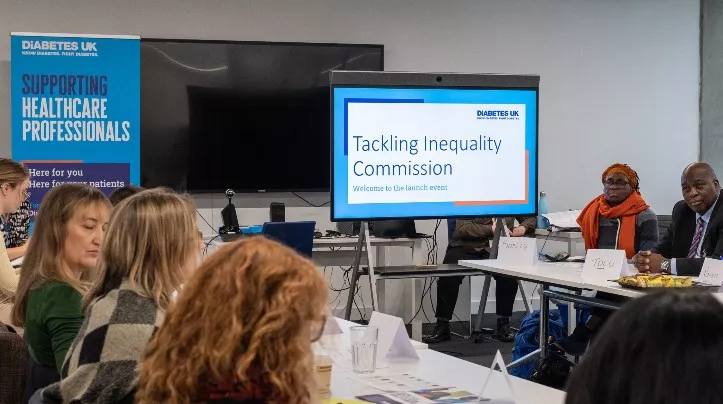
We have launched a new report which makes a series of recommendations to help tackle inequality against people living with diabetes in the UK. Colette Marshall, Chief Executive of Diabetes UK, introduces the report and what we’ll be doing in 2024.
The ‘Tackling Inequality Commission Report’ has been informed by the experiences of more than 100 people living with diabetes across the UK.
It sets out the findings of the Diabetes UK Tackling Inequality Commission, which was established earlier this year. The commission looked at the multiple factors that contribute to health inequality in diabetes, particularly for people living in deprivation and for Black and South Asian communities.
Over six months, the Commission heard from over 100 people living with diabetes aged 18-80 years in all four nations of the UK about the daily struggles they face.
This lived experience testimony from a participant in the report showed how difficult it can be for some to access healthy food options.
“We experience food poverty really because we haven't got the shops around us. And when you want the good stuff, it's too expensive. And I mean, even when you go to the food bank, the food bank doesn't give you stuff like that.”
What the report recommends
The report issues seven key calls to action to governments, healthcare professionals and policymakers as part of our commitment to tackle inequality.
Our recommendations include governments acknowledging the impact of systemic racism on health and using anti-racism to address this. As well as addressing the wider environmental factors that can increase someone’s risk of type 2 diabetes.
These recommendations extend to the wider system of the local and national government, as well as other charities whose work affects people living with and at risk of diabetes, and employers and private industry.
What are we doing next?
Building on this report, Diabetes UK will be focusing on the following priorities in 2024:
- Ensuring the lived experience of people from all backgrounds and ethnicities informs our work and that of our partners.
- Updating our information and support (including food guides and training modules for healthcare professionals) so that it is relevant and accessible.
- Increasing the evidence base around how to address inequality in diabetes and the diversity of the diabetes research community.
- Improving the collection of demographic data across our work; for example, to understand where there could be barriers in our grant applications.
- Ensuring that Diabetes UK is an equitable, diverse and inclusive organisation; for example, by reviewing our approach to recruitment.
We know diabetes doesn’t affect everyone equally, and a person’s ethnic group, where they live and their income all affect their chances of getting type 2 diabetes, the care they get for any type of diabetes and their long-term outcomes.
We’re confident we can reduce the impact of inequality on people with diabetes, but to do this we need to be bold, and those who have the power to drive this change.
While we have already been doing a lot of work in this area, the clear focus from the Tackling Inequality Commission Report will give us, individuals, organisations and systems the ability to make practical, tangible changes to tackle the inequalities we’re seeing.
You can download the full Tackling Inequality Commission Report (PDF, 11,580KB) here.
This Tackling Inequality Commission Report has been developed by Diabetes UK and its designated co-chairs, kindly supported by sponsorship funding from Eli Lilly and Company, and Abbott. These sponsors have contributed evidence where appropriate through our open calls but have had no responsibility for developing or shaping the content of this work or the recommendations of the report.
